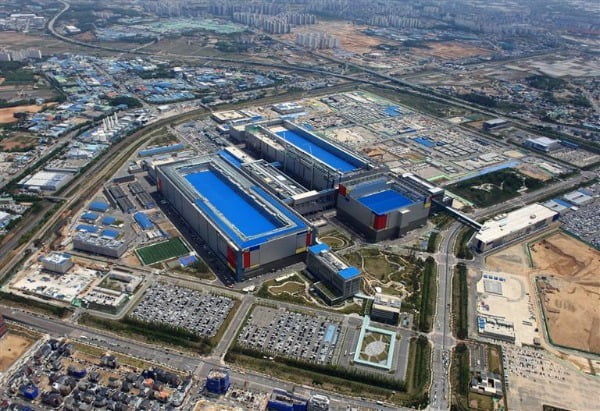Samsung Electronics decided to start early operation of a new foundry (semiconductor contract manufacturing) line (P2) at the Pyeongtaek plant in Gyeonggi Province. The price of 8-inch (200 mm) wafer semiconductors was also increased by two orders of magnitude. It is interpreted as a decision to maximize business opportunities as it enters the’super cycle’ phase with semiconductor shortage.

According to Samsung Electronics on the 21st, the foundry division revealed such an aggressive business plan through a recent disclosure. It also decided to increase production at the Hwaseong Plant (V1) in Gyeonggi Province, a line dedicated to extreme ultraviolet (EUV). In the industry, it is predicted that Samsung Electronics will ramp up V1 (expand production) in the first half of the year and turn the P2 line as early as July.
In the global market, there is a’war for securing semiconductors’ between smartphones, home appliances, and automobile companies. General Motors (GM), Volkswagen, and Sony are unable to produce as many products as they want due to lack of semiconductors. An industry insider said, “The demand is coming to the point that the foundry order has been full for more than a year,” and “there are pouring orders from customers who have entrusted production to advance the supply period.”
The precious old semiconductor… Samsung Electronics to increase 8-inch foundry unit price by 10-15%
Chip joint development with Facebook and Tesla
Samsung Electronics also revealed a plan to increase the unit price of an 8-inch (200 mm) wafer-based foundry and expand its business. In the industry, it is expected that Samsung Electronics will increase its price by 10-15% compared to the existing unit price.
Samsung Electronics’ Foundry Division is mass-producing 8-inch products by receiving orders from customers at Line 6 of the Giheung plant in Yongin, Gyeonggi Province. In the meantime, the 8-inch process was treated as’gyereuk’ and the investment ranking was apt to be pushed back. This is because the production of chips per unit area is less than that of the flagship 12-inch (300 mm) wafer-based process, and productivity is not high due to aging equipment.
The growing interest in the 8-inch process was due to the rapid increase in demand for display driving chips (DDI), image sensors, and automotive semiconductor microcontrol units (MCU) from the fourth quarter of last year. These products are not more complicated in design than the central processing unit (CPU), so they are mainly produced in the 8-inch line rather than the 12-inch ultra-fine process.
In particular, the shortage of automotive MCUs raised the ransom by 8 inches. As vehicle sales fell sharply in the aftermath of the spread of Corona 19 in the first half of last year, demand for MCUs also decreased. Accordingly, foundry companies turned the 8-inch line to DDI production. In this situation, as orders for automotive semiconductors including MCUs surged from the fourth quarter of last year, the overall “supply shortage” of the 8-inch line became serious. According to KOTRA, as of the 11th, 85 automobile factories around the world stopped operating for more than one day due to’shortage of semiconductors’. An official of Samsung Electronics explained, “The 8-inch process is in a situation where supply is insufficient compared to demand.” “We plan to improve profitability and focus on business expansion through selection and concentration focusing on higher selling prices and high-margin products.
The System LSI Division, which designs and sells communication chips and image sensors, has declared that it will expand new businesses such as the development of SoC (System on Chip) and custom SoC for automotive electronic equipment (electronic equipment). Samsung Electronics has developed an electronic chip’Exynos Auto’ and delivered it to Audi. As the demand for semiconductors has increased due to the recent development of future vehicles such as self-driving cars, it is evaluated to have expressed a will to strengthen the competitiveness of’electronic SoC’.
‘Expanding custom SoC’ means to expand services that help design chips by receiving requests from external customers such as Google, Facebook, and Tesla. These companies are striving to develop their own chips in fields related to artificial intelligence (AI) to escape the influence of traditional semiconductor companies. In addition, he emphasized the intention to prevent production disruptions by increasing the number of foundries that entrust outsourcing production. It is known that Samsung Electronics recently left some of the image sensors to Taiwan UMC, not its foundry.
Reporter Hwang Jeong-soo [email protected]
